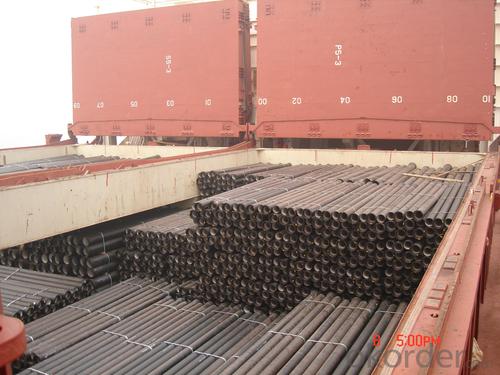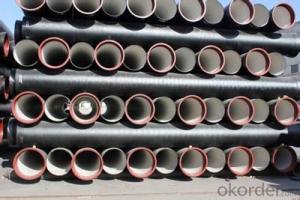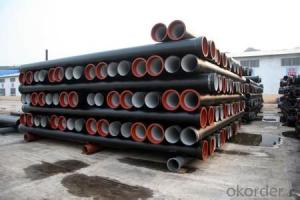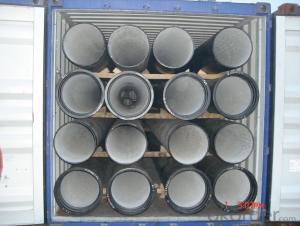DUCTILE IRON PIPE DN300 K8
- Loading Port:
- China Main Port
- Payment Terms:
- TT OR LC
- Min Order Qty:
- -
- Supply Capability:
- -
OKorder Service Pledge
OKorder Financial Service
You Might Also Like
Specification:
1) The standard of pipe: ISO2531:1998, K9
2) Effective length: 6m
3) Inner cement line: Portland cement line as per ISO4179
4) Zinc coating: at least 130g/m2 as per ISO8179
5) Bitumen painting: at least 70um as per ISO8179
6) With 100% quantity of NBR ring, or SBR ring, or EPDM ring as per ISO4633
7) DN80mm-800mm
8) High strength, lighter than grey iron, good corrosion resistance, no furring, small flow resistance, easy fixing, long life tome about 100 yeas
9) Produced by Hangzhou chunfeng machine
10) Checked by automatic inspection equipment
11) Composition:
Chemical composition | | | | |||
Chemical composition | Ductile Cast Iron Pipe (%) | Grey iron pipe (%) | Steel pipe (%) | | | |
C | 3.5-4.0 | 3.2-3.8 | 0.1-0.2 | | | |
Si | 1.9-2.6 | 1.4-2.2 | 0.15-0.4 | | | |
Mn | 0.15-0.45 | 0.4-0.6 | 0.3-0.6 | | | |
P | ≤0.06 | ≤0.3 | 0.02-0.03 | | | |
S | ≤0.02 | ≤0.1 | 0.02-0.03 | | | |
Mg | 0.03-0.06 |
|
| | | |
12) Feature:
Mechanical properties | | | | |||
| Ductile Cast Iron Pipe | Grey Iron Pipe | Steel Pipe | | | |
Tensile Strength(Mpa) | ≥420 | 150-260 | ≥400 | | | |
Yield Strength(Mpa) | ≥300 | No Confirmation | No Confirmation | | | |
Bending Strength(Mpa) | ≥590 | 200-360 | ≥400 | | | |
Elongation (%) | ≥10 | Neglected | ≥18 | | | |
Brinell Hardness(HBS) | ≤230 | ≤230 | About 140 | | | |
13) T type mechanical joint
14) Packing: in bulk or container
- Q: Are ductile iron pipes suitable for installation in areas with high groundwater salinity?
- Ductile iron pipes are generally suitable for installation in areas with high groundwater salinity. Ductile iron is known for its corrosion resistance, making it a preferred choice for various applications, including water and wastewater systems. High groundwater salinity refers to an increased presence of dissolved salts in the water. While this can potentially cause corrosion in certain materials, ductile iron pipes are designed to withstand such conditions. Ductile iron pipes have a protective lining, typically made of cement mortar or polyurethane, which acts as a barrier between the pipe and the surrounding environment, including high salinity water. The lining helps to prevent any corrosive effects of the high groundwater salinity on the iron pipe, ensuring its long-term durability and reliability. Additionally, ductile iron pipes have a high tensile strength, allowing them to withstand external loads and pressure, even in challenging environments. It is important to note that the suitability of ductile iron pipes for areas with high groundwater salinity can also depend on factors such as the specific levels of salinity, the presence of other corrosive agents, and the overall design and installation practices. Therefore, it is recommended to consult with experts or engineers familiar with the local conditions to determine the most appropriate materials and precautions for specific installation projects.
- Q: Can ductile iron pipes be used for underground hydrocarbon pipelines?
- Yes, ductile iron pipes can be used for underground hydrocarbon pipelines. Ductile iron pipes are known for their strength, durability, and resistance to corrosion, making them suitable for transporting hydrocarbons underground. However, it is important to consider factors like the specific hydrocarbon being transported, pressure requirements, and regulatory standards before selecting the appropriate material for the pipeline.
- Q: Can ductile iron pipes be used for both water and wastewater applications?
- Yes, ductile iron pipes can be used for both water and wastewater applications. Ductile iron pipes are known for their durability, strength, and corrosion resistance, making them suitable for a wide range of applications including water distribution, sewage systems, and wastewater treatment plants. These pipes are designed to withstand high pressure and are capable of handling the flow of both water and wastewater. Additionally, ductile iron pipes have a long lifespan, reducing the need for frequent replacements and maintenance, which makes them a cost-effective choice for both water and wastewater applications.
- Q: How does ductile iron pipe perform in areas with high soil contamination?
- Ductile iron pipe performs exceptionally well in areas with high soil contamination due to its inherent strength, durability, and corrosion resistance properties. The material used in manufacturing ductile iron pipes is highly resistant to chemical attack, making it suitable for handling various types of contaminated soils, including those with high levels of acids, alkalis, and other corrosive substances. The corrosion resistance of ductile iron pipes is primarily attributed to their protective internal and external linings, which are designed to prevent contact between the pipe material and the surrounding soil or fluids. These linings act as a barrier, preventing the penetration of corrosive elements and reducing the risk of pipe degradation or failure. Additionally, ductile iron pipes can be further protected by applying external coatings or cathodic protection systems, which enhance their resistance to soil contamination and extend their service life. In areas with high soil contamination, ductile iron pipes offer significant advantages over other materials such as steel or concrete. Their high strength allows them to withstand the external loads imposed by the contaminated soil, reducing the risk of structural failure or deformation. Moreover, the inherent flexibility of ductile iron allows it to absorb ground movements or settlement without compromising its integrity, making it a reliable choice for areas prone to soil instability or shifting. Furthermore, ductile iron pipes have a smooth internal surface, which minimizes friction and helps maintain efficient flow rates even in the presence of contaminants. This characteristic is particularly important in areas with high soil contamination, where debris or sedimentation can accumulate and hinder fluid flow. The smooth bore of ductile iron pipes reduces the risk of clogging and ensures the continuous and reliable conveyance of fluids, even in challenging soil conditions. Overall, ductile iron pipe is a highly suitable choice for areas with high soil contamination. Its excellent corrosion resistance, strength, flexibility, and smooth internal surface make it a reliable and durable solution for conveying fluids in these challenging environments.
- Q: Can ductile iron pipe be used for water treatment plant sludge handling?
- Yes, ductile iron pipe can be used for water treatment plant sludge handling. Ductile iron pipe is known for its strength and durability, making it suitable for handling various types of fluids, including sludge. It can withstand the corrosive nature of sludge and is resistant to abrasion, which is important in a sludge handling system. Additionally, ductile iron pipe has a smooth interior surface, which helps to prevent clogs and allows for efficient flow of the sludge. Overall, ductile iron pipe is a reliable choice for water treatment plant sludge handling.
- Q: How are ductile iron pipes repaired if they get damaged?
- Ductile iron pipes are typically repaired using various methods depending on the extent of the damage. Common repair techniques include spot repair, where damaged sections are cut out and replaced with new pipe sections, and trenchless repair methods such as pipe lining or pipe bursting. These methods minimize disruption and excavation while ensuring the structural integrity of the pipe is restored.
- Q: What effect does magnesium play in nodular cast iron?
- Magnesium can be graphite precipitated in spherical form.But the specific mechanism is not clear, and now it is still debated in the academic circles.In addition, magnesium and sulfur generate MgS, which removes S from molten iron, which impedes the formation of spheroidal graphite.Therefore, Mg has two functions to eliminate the influence of S on Nodular Iron and promote the precipitation of graphite in spherical form.
- Q: There are several forms of flexible interfaces for Spigot Cast Iron Pipes
- At present, the flexible interfaces include slip type rubber ring interface, R rubber ring interface, flexible mechanical interface, A type and flexible mechanical interface, K type.1. slip in rubber ring interfaceRubber ring and pipe are supplied by supply factory. A rubber ring is installed before the socket in the working surface and no tower water supply equipment Jack working surface cleaned, the rubber ring embedded concave socket tip in the rubber ring, and the exposed surface and the socket of the working face, coated with lubricant has no influence on the quality of the rubber ring. The water supply equipment socket end chamfering and rubber ring even after contact with special tool socket socket will push, push people to mark depth should be set in advance, before the festival, before the two push interface depth and review has been.
- Q: What pipe can be used to replace the cast iron pipe in the water supply? Thank you
- You are mistaken in concept. The cast iron pipe is the sort of connection method. The ductile iron pipe is classified according to the material.
- Q: Can ductile iron pipes be repaired if they get damaged?
- If ductile iron pipes sustain damage, it is indeed possible to repair them. To carry out the repair, the first step involves identifying the specific section of the pipe that has been damaged, followed by assessing the extent of the damage. In the case of minor damage, there are several techniques available for repair, including welding or applying epoxy lining. However, if the damage is more severe, it may be necessary to replace certain sections of the pipe. Professionals who specialize in pipe repair possess the necessary skills and equipment to accurately identify and effectively fix damaged ductile iron pipes, thereby guaranteeing their ongoing functionality and durability.
Send your message to us
DUCTILE IRON PIPE DN300 K8
- Loading Port:
- China Main Port
- Payment Terms:
- TT OR LC
- Min Order Qty:
- -
- Supply Capability:
- -
OKorder Service Pledge
OKorder Financial Service
Similar products
Hot products
Hot Searches
Related keywords

























